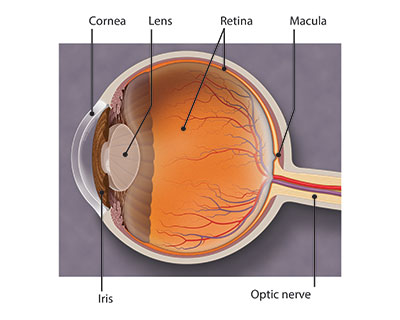Ischemic optic neuropathy (ION) is when blood does not flow properly to your eye’s optic nerve, eventually causing lasting damage to this nerve. With ION, you suddenly lose your vision in one or both of your eyes.

The optic nerve carries signals from your eyes to the brain. Your brain then turns these signals into the images you see. When blood flow to the optic nerve is reduced or blocked, the nerve does not get enough oxygen or nutrition. The optic nerve stops working properly, and eventually dies.
ION can affect your central (detail) vision or side (peripheral) vision—or both. Because a damaged optic nerve cannot be fixed, any vision loss from ION is usually permanent. Usually, people with severe ION still have some peripheral vision.
What are symptoms of ION?
If blood flow to your optic nerve is reduced, your vision will darken for a few seconds or minutes then return to normal. This is called a transient ischemic attack (TIA). This kind of attack can happen before ION begins. If you have TIA symptoms, call your ophthalmologist or primary care doctor right away. Finding and treating the problem as soon as possible can help prevent further vision loss from ION.
Who is at risk for ION?
While anyone can get ischemic optic neuropathy (ION), you are more likely to develop it if you:
- have high blood pressure
- have high cholesterol (too much fat or lipid in your blood)
- sleep apnea
- heart disease
- sudden drop in blood pressure or blood loss
- have diabetes
- have clogged arteries
- have glaucoma
- are over 50 years old
- have migraine headaches
- have swelling of arteries in the head (called temporal arteritis), which may be life-threatening and cause massive vision loss
Diagnosis
Your ophthalmologist will do an eye exam to look for warning signs of ischemic optic neuropathy (ION). He or she will dilate (widen) your pupils with eye drops and then check for swelling of the optic nerve and blood vessels in the back of your eye.
Your ophthalmologist may also:
Treatment
If your ION is caused by swelling of arteries in your head (temporal arteritis), your ophthalmologist may have you take steroid (prednisone) pills. This medicine may prevent ION from developing in your other eye.
Your doctor may want to treat any other health problems you have that put you at risk for ION. He or she may prescribe medicine for high blood pressure, diabetes, clogged arteries, migraine headaches, or other health problems.
There is no treatment to improve vision loss from ION. However, your ophthalmologist may suggest magnifiers, assistive technology devices and other techniques to manage your activities with low vision. Fortunately, ION happens in one eye more often than in both eyes.